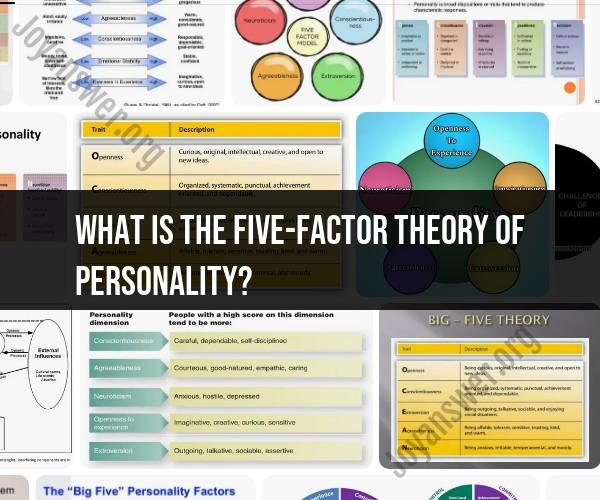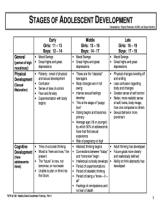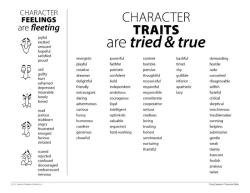What is the five-factor theory of personality?
The Five-Factor Theory of Personality, also known as the Big Five personality traits, is a model of personality that describes personality in terms of five broad factors:
- Extraversion: People who are high in extraversion are outgoing, sociable, and assertive. They enjoy being around other people and tend to be the life of the party.
- Agreeableness: People who are high in agreeableness are cooperative, trusting, and helpful. They tend to be good listeners and are often described as "nice" people.
- Conscientiousness: People who are high in conscientiousness are organized, reliable, and efficient. They tend to be perfectionists and have a strong work ethic.
- Neuroticism: People who are high in neuroticism are emotionally unstable and tend to experience negative emotions, such as anxiety, worry, and sadness.
- Openness to Experience: People who are high in openness to experience are curious, creative, and imaginative. They enjoy new experiences and are often described as "intellectuals."
The Five-Factor Theory of Personality is one of the most widely accepted and well-researched models of personality. It has been shown to be useful in predicting a variety of outcomes, including job performance, academic success, and relationship satisfaction.
Here are some examples of how the Big Five personality traits can manifest themselves in everyday life:
- Extraversion: An extraverted person might be the one to organize social events, start conversations, and be the center of attention at a party.
- Agreeableness: An agreeable person might be the one to volunteer to help out a friend, go out of their way to be polite, and avoid conflict.
- Conscientiousness: A conscientious person might be the one to arrive to work early, meet deadlines, and be organized and efficient.
- Neuroticism: A neurotic person might be the one to worry about things that are out of their control, experience anxiety in social situations, and be easily upset.
- Openness to Experience: An open-minded person might be the one to try new foods, travel to new places, and be interested in learning new things.
It is important to note that everyone falls on a spectrum for each of the Big Five personality traits. There is no right or wrong answer, and no one trait is better than another. Everyone has a unique combination of personality traits that makes them who they are.
The Five-Factor Theory of Personality is a useful framework for understanding human personality. It can help us to better understand ourselves and others, and to appreciate the diversity of human experience.
Five-Factor Theory of Personality: An In-Depth Exploration
The Five-Factor Theory of Personality, also known as the Five-Factor Model (FFM), is a prominent framework in psychology for understanding and measuring personality traits. In this comprehensive exploration, we will delve into the intricacies of the Five-Factor Theory, providing an in-depth understanding of its components, applications, and significance in the field of psychology.
Introduction to the Five-Factor Theory
The Five-Factor Theory of Personality posits that there are five core personality traits that collectively encompass the entirety of human personality. These traits are often referred to as the "Big Five" and are considered the building blocks of personality assessment and research.
2. The Five Core Personality Traits
2.1. Openness to Experience
Openness to experience reflects an individual's willingness to embrace novelty, new ideas, and experiences. Those high in this trait tend to be imaginative, creative, and open-minded, while those low in openness may be more conventional and resistant to change.
2.2. Conscientiousness
Conscientiousness measures an individual's level of organization, responsibility, and self-discipline. Highly conscientious individuals are typically organized, reliable, and goal-oriented, whereas those low in conscientiousness may be more impulsive and disorganized.
2.3. Extraversion
Extraversion relates to an individual's sociability, assertiveness, and preference for social interactions. Extraverts are outgoing, talkative, and energized by social situations, whereas introverts tend to be more reserved and may find social interactions draining.
2.4. Agreeableness
Agreeableness assesses an individual's interpersonal tendencies, including their kindness, cooperativeness, and empathy. Highly agreeable individuals are often compassionate and cooperative, while those low in agreeableness may be more competitive or skeptical.
2.5. Neuroticism
Neuroticism gauges emotional stability and resilience to stress. Individuals high in neuroticism may experience heightened anxiety, mood swings, and emotional reactivity, while those low in neuroticism tend to be more emotionally stable and composed.
3. Measuring the Big Five
The Five-Factor Model is widely used in psychology and is assessed through self-report questionnaires. Researchers have developed numerous personality assessments, such as the NEO-PI-R and the Big Five Inventory (BFI), to measure these traits. Respondents rate themselves on a series of statements, and their scores on each trait provide a profile of their personality.
4. Applications of the Five-Factor Model
4.1. Psychological Research
The Five-Factor Model is a cornerstone of personality psychology, serving as a framework for understanding individual differences and behaviors. Researchers use this model to explore personality traits' impact on various aspects of life, including relationships, career choices, and mental health.
4.2. Clinical Psychology
In clinical psychology, the Five-Factor Model has applications in understanding and assessing personality disorders, as well as informing treatment approaches. It helps clinicians tailor interventions based on an individual's personality profile.
4.3. Human Resources and Organizational Psychology
The Five-Factor Model is also utilized in the business world for personnel selection and team dynamics. It aids in assessing job candidates' suitability for specific roles and predicting their performance and job satisfaction.
5. Critiques and Ongoing Research
While the Five-Factor Model has significantly influenced the field of psychology, it is not without its critiques and ongoing debates. Some researchers argue that it may not capture the full complexity of human personality. As a result, there are continued efforts to refine and expand upon the model.
Conclusion
The Five-Factor Theory of Personality, with its five core traits of openness to experience, conscientiousness, extraversion, agreeableness, and neuroticism, has revolutionized the study of personality. It provides a comprehensive framework for understanding individual differences and has applications in various domains, from psychological research to clinical practice and beyond. While it is not without its limitations, the Five-Factor Model remains a central concept in the field of personality psychology, shedding light on the intricate tapestry of human personality.












